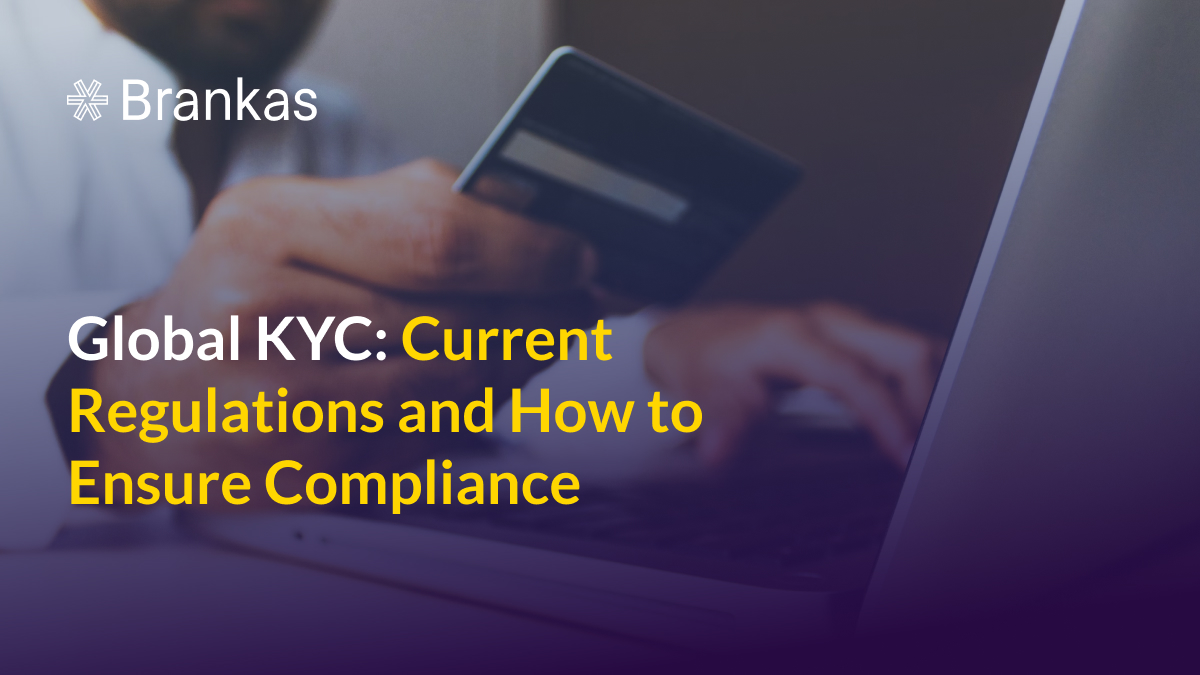In today’s global economy, a business’ financial dealings are not limited to a specific territory or country. Many businesses operate beyond borders, spanning diverse markets and sectors. To keep transactions secure and protect financial institutions from fraud, corruption, money laundering and terrorist financing, there are crucial pillars that hold up the entire system. Know Your Customer (KYC) practices ensure that all players comply with strict standards while protecting them from significant financial risks.
In this article, we’ll explore the importance of Know Your Customer regulations in preventing financial crimes, provide an overview of differing global KYC standards across regions, and explore the technology and tools available to maintain compliance and navigate challenges.
What is KYC?
To better understand why global KYC is necessary, it’s important to first define what is KYC. Know Your Customer or KYC is a process that involves verifying customers' identities before providing any type of service. KYC checks include collecting and analyzing customer data such as name, address, date of birth, employment details, and other proof of identity. It is a critical component of Anti-Money Laundering (AML) and Counter-Financing of Terrorism (CFT) measures.
Why KYC Matters
Apart from its role in maintaining the overall integrity and security of financial systems across the globe, KYC is mandatory for financial institutions. Adhering to these standards offers several benefits:
• Prevention of Financial Crimes: KYC global regulations mitigate risks of fraud, money laundering, and other illicit activities.
• Regulatory Compliance: Failing to comply with KYC laws can lead to hefty penalties and reputational damage.
• Efficiency: Standardized compliance reduces bottlenecks in cross-border transactions, which streamlines processes.
• Stronger Security: Strong KYC practices ensure only legitimate individuals can access services.
• Enhanced Reputation: KYC helps build customer trust and loyalty.
How KYC Works
For most financial institutions, KYC is part of their onboarding process when dealing with clients who wish to open a bank account, invest, apply for a loan or credit card, or buy insurance. KYC checks are traditionally done in person—with the client personally filling out forms and submitting pertinent documents and other requirements. However, with the emergence of digital banking, KYC processes can now be accomplished online.
The KYC process has three key steps:
1. Customer Identification
The first component in any global KYC compliance program is to verify the customer’s identity. This involves gathering accurate personal information such as full name, date of birth, address, nationality, specimen signatures, and biometrics. Customers must provide valid KYC documents to confirm their identity, including
• Proof of Identity: Passport, driver’s license, government-issued ID, voter ID, etc.
• Proof of Address: Utility bills, bank statements, credit card statements, property tax receipts, etc.
• Proof of Income: Recent pay slips, certificate of employment, tax accounts, etc.
2. Customer Due Diligence
In addition to confirming the identity of customers, financial institutions need to conduct more thorough checks for high-risk customers. CDD involves a more in-depth examination of the customers’ activities and their risk level to ensure ongoing compliance.
There are three levels of due diligence:
Simplified Due Diligence
Simplified Due Diligence (SDD) is when the customer is low risk and a full CDD is unnecessary. This means that the customer has little or no opportunity to become involved in illicit activities like money laundering or terrorist financing. Under SDD, customers can be identified without extensive verification.
Basic Customer Due Diligence
Basic Customer Due Diligence (CDD) is the baseline level of due diligence. This is a deeper level of investigation that involves verifying the customer’s background, nature of transactions, and source of funds. However, the customer’s risk is neither very high nor very low.
Enhanced Due Diligence
EDD is the highest level of due diligence and is applied to Politically Exposed Persons (PEPs) or those involved in complex transactions. Since EDD is the most stringent level of KYC and is typically reserved for high-risk individuals, financial institutions may need to do more extensive checks.
3. Ongoing Monitoring
Ongoing monitoring is the most essential of KYC requirements. Financial institutions must continuously monitor customer accounts and transactions for any suspicious activities or anomalies. Any suspicious or unusual activity should be immediately reported to the relevant authorities, depending on the jurisdiction. For example, providers of payment solutions are obligated to seek identity verification periodically to check if the user is still who they claim to be.

KYC at the Global Scale
Global KYC, at its core, is intended to protect financial institutions and companies from bad actors with malicious intentions. The Financial Action Task Force (FATF) sets international standards for KYC, which are then adopted by individual countries depending on their own needs and risks.
How Does KYC Differ Globally?
Different countries have their own cultures, languages, legal systems, and technologies, which impact how businesses handle KYC. Understanding these local nuances is beneficial not only for compliance; it’s also a strategic move if you want to break into new markets or expand your services to other countries.
For instance, more businesses are moving their operations online. To ensure KYC global compliance, many companies have adopted eKYC. eKYC or Electronic Know Your Customer refers to the digitalized process of identity confirmation. This is just one example of emerging trends and challenges that make global KYC more nuanced.
Here’s an overview of territory-specific KYC frameworks you need to consider:
North America
The US and Canada spearhead KYC regulations in North America. In the US, the Bank Secrecy Act (BSA) and the USA Patriot Act mandate financial institutions to perform KYC checks. Their priorities include counter-terrorism financing (CTF) and anti-money laundering (AML). In Canada, the Financial Transactions and Reports Analysis Centre of Canada (FINTRAC) oversees KYC regulations.
Latin America (South America, Central America, and the Caribbean)
KYC regulations in Latin America are also evolving. KYC challenges in these regions, such as diverse risk profiles, add a layer of complexity that financial organizations may need to be wary of. For example, Brazil has implemented KYC measures under the Central Bank. Meanwhile, the Financial Information Unit (FIU) handles KYC and AML compliance in Argentina.
Europe and the United Kingdom
The European Union has adopted strict legislation to counter money laundering and terrorist financing. Their KYC framework is indicated in the 5th Anti-Money Laundering Directive (AMLD5), which applies to all member states.
On the other hand, the Financial Conduct Authority (FCA) is the primary regulator for most financial services in the UK. All UK financial institutions must comply with two levels of Customer Due Diligence, including Basic KYC and Enhanced Due Diligence. They must also check if customers or entities are part of sanction lists monitored by the Office of Financial Sanctions Implementation (OFSI) to ensure that they are not transacting with them.
Asia
KYC in Asia varies by country, but most abide by the recommendations of the Financial Action Task Force (FATF). For example, the Monetary Authority of Singapore (MAS) enforces strict KYC guidelines as part of its AML and CFT measures in Singapore. On the other hand, the Bangko Sentral ng Pilipinas (BSP) mandates customer verification and transaction monitoring in the Philippines.
Oceania
The Anti-Money Laundering and Counter-Terrorism Financing Act of 2006 is regulated by the Australian Transaction Reports and Analysis Centre (AUSTRAC) in Australia. In New Zealand, compliance is supervised by the Reserve Bank and Financial Markets Authority.
Middle East
The UAE Central Bank regulates KYC compliance through its AML guidelines. In Saudi Arabia, KYC is monitored by the Saudi Arabian Monetary Authority (SAMA).
Africa
KYC compliance in Africa varies across countries. Their focus is on combating financial crimes and fostering financial inclusion. Regulators include the Central Bank of Nigeria (CBN), South Africa’s Financial Intelligence Centre (FIC), and regional bodies like the Eastern and Southern Africa Anti-Money Laundering Group (ESAAMLG), ensuring adherence to FATF guidelines.
Specific regulations may vary by country and region, but all of them have the same goal—to ensure people are who they say they are when they’re engaging in financial transactions. A strong KYC global compliance program generally includes the means to verify customer identity, assess risk, conduct all three levels of due diligence, and perform continuous monitoring.
Addressing Challenges in Global KYC Compliance
It is clear why KYC is essential to safeguarding the integrity of the global financial system and economy. By implementing robust KYC measures, financial institutions not only establish resilience and stability but also protect the interests of stakeholders, consumers, and society as a whole.
However, achieving KYC compliance can be extremely challenging to accomplish, especially if you are trying to penetrate new markets or localities. Fortunately, technology is making it easier for financial institutions and fintech companies to expand their reach and streamline their transactions.
Unlock the Future of Finance with Brankas
This is where Brankas comes in. Brankas simplifies KYC compliance by offering a secure, seamless API suite tailored for global markets. As a reputable provider of open finance solutions in APAC and MENA, we offer tools that ensure compliance without compromising user experience.
For example, our automated disbursement solutions minimize manual errors and accelerate compliance checks to ensure that only the correct recipients receive funds from your corporate bank account. Explore how our innovative technology can transform your operations and drive growth. Try Brankas for free today.
